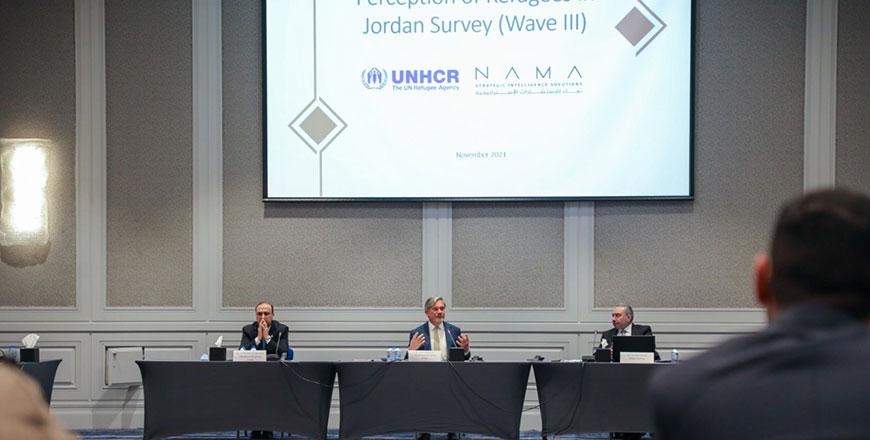You are here
Only 14 per cent of Syrian refugees ‘very determined’ to return — poll
By Jassar Al Tahat - Dec 16,2018 - Last updated at Dec 16,2018
AMMAN — Thirty-two per cent of Syrian refugees in Jordan are sure that they will not return to their homeland, while only 14 per cent are “very determined” to return to Syria.
These numbers were presented during a press conference conducted by NAMA for Strategic Intelligence Solutions on Sunday to discuss the preliminary results of a poll titled, “Will Syrian Refugees Return to Syria?” The poll was conducted in cooperation with the Konrad Adenauer Stiftung.
The survey was conducted in November and covered two samples comprising of 1,305 Jordanians, drawn according to a probability multistage cluster design, and 600 Syrian refugees in Jordan, selected according to a snowball targeted sampling approach of 150 interviewees. It was split in half between males and females in Amman, Zarqa, Irbid and Mafraq.
Fares Braizat, chairman of NAMA said that “this subject is very important to both the Jordanian public and decision makers and to the international community. Providing scientific and trusted information is crucial for use in policy development”.
According to the poll, 85 per cent of Jordanians answered yes on whether Syrian refugees should return to Syria, while 34 per cent of Syrians answered no.
Fifty-three per cent of Syrian refugees who took part in the poll answered no when asked if Jordan should have done more to support Syrian refugees, while 47 per cent answered yes to the same question.
The Jordan Times was able to review unpublished results regarding Jordanians’ perspective on the impact of the Syrian refugee crisis on Jordan.
The majority of Jordanians who took part in the poll said that the Syrian crisis had a positive impact on the international perception of the Kingdom. However, the vast majority of the same sample thought that the Syrian conflict had a negative impact on trust in public and governmental institutions, security, infrastructure, environment, water supply, education, labour market, healthcare, public debt and the overall economy.
“The Jordanian public opinion has a strong stance on how the Syrian refugee crisis affected them. There is also a large segment of Jordanians who believe that the Syrian crisis had a direct negative impact on the Kingdom’s economy,” said Braizat.
The majority of both Syrians and Jordanians said that Syrian refugees should return only when Syria restores safety and stability.
A divide between both samples (Jordanians and Syrians) is seen when asked about the possibility of improvement in the Kingdom’s economy, as 76 per cent of Syrians thought the economy would improve, while almost 50 per cent of Jordanians thought it would worsen.
The poll also addressed Jordanian pull factors, such as a good perception of Jordan among Syrian refugees. The majority, or 67 per cent, of Syrian refugees felt welcome in Jordan, and 92 per cent of Syrian refugees in Jordan thought it an advantage to be a refugee in an Arab country with a similar language and culture.
Answering a question about the recent work permits provided to Syrian refugees and whether it would provide another reason for them not to go back, Braizat said: “There are many factors playing a role in the return of refugees, first of which is the perception that the war is not over.”
Answering The Jordan Times’ question, Braizat said, “Analysing the numbers, it is clear that the main concern [of Syrian refugees] is safety, security and reconstruction, and not who is the head of state; that matters only to those who do not want to return.”
Related Articles
AMMAN — Thirty-two per cent of Syrian refugees in Jordan are sure that they will not return to their homeland, while only 14 per cent
AMMAN — A majority of Jordanians, standing at 92 per cent, feel sympathetic towards refugees in Jordan, according to a newly released public
AMMAN — NAMA Strategic Intelligence Solutions (NAMA) recently published a national poll studying Jordanians’ perceptions of peace, stability

















